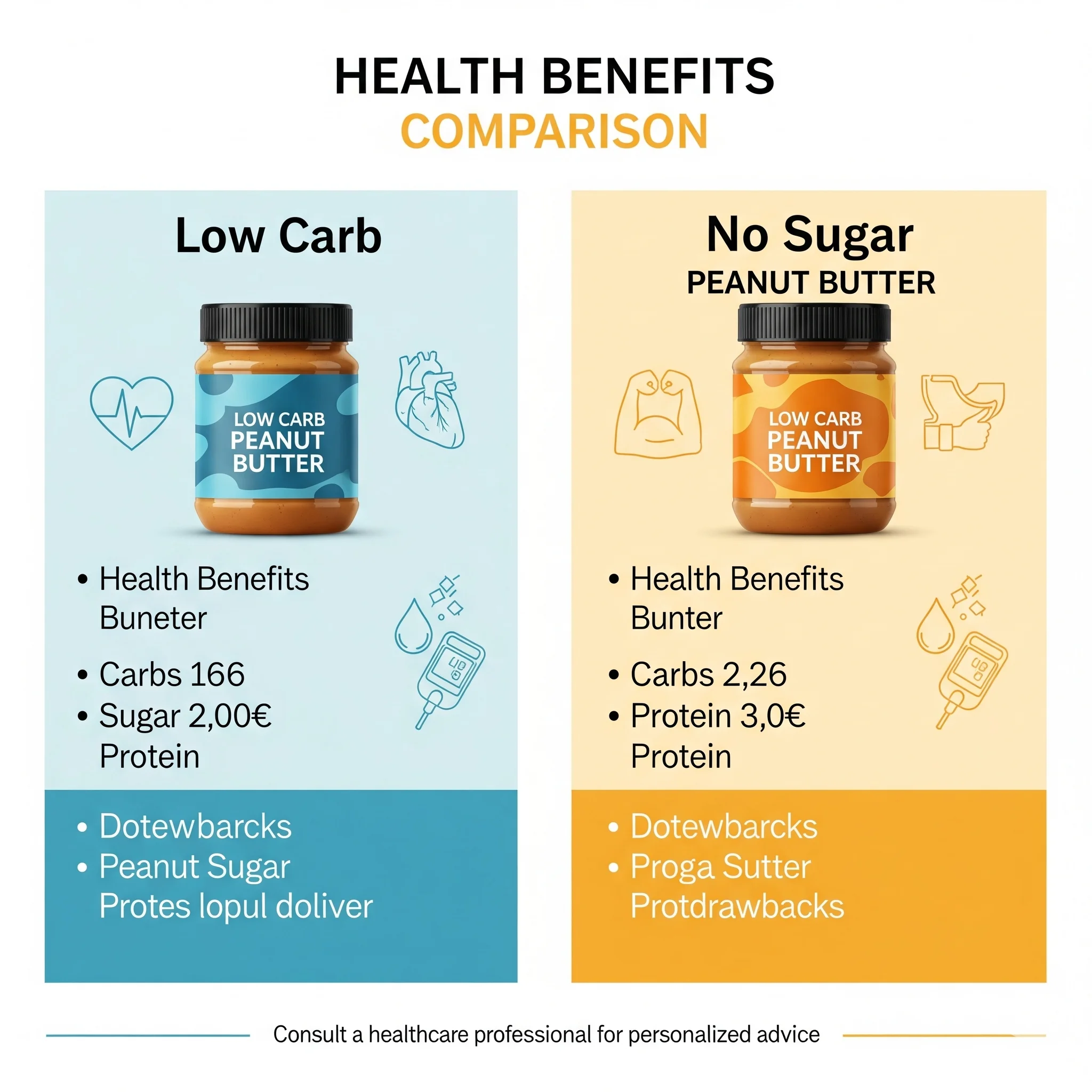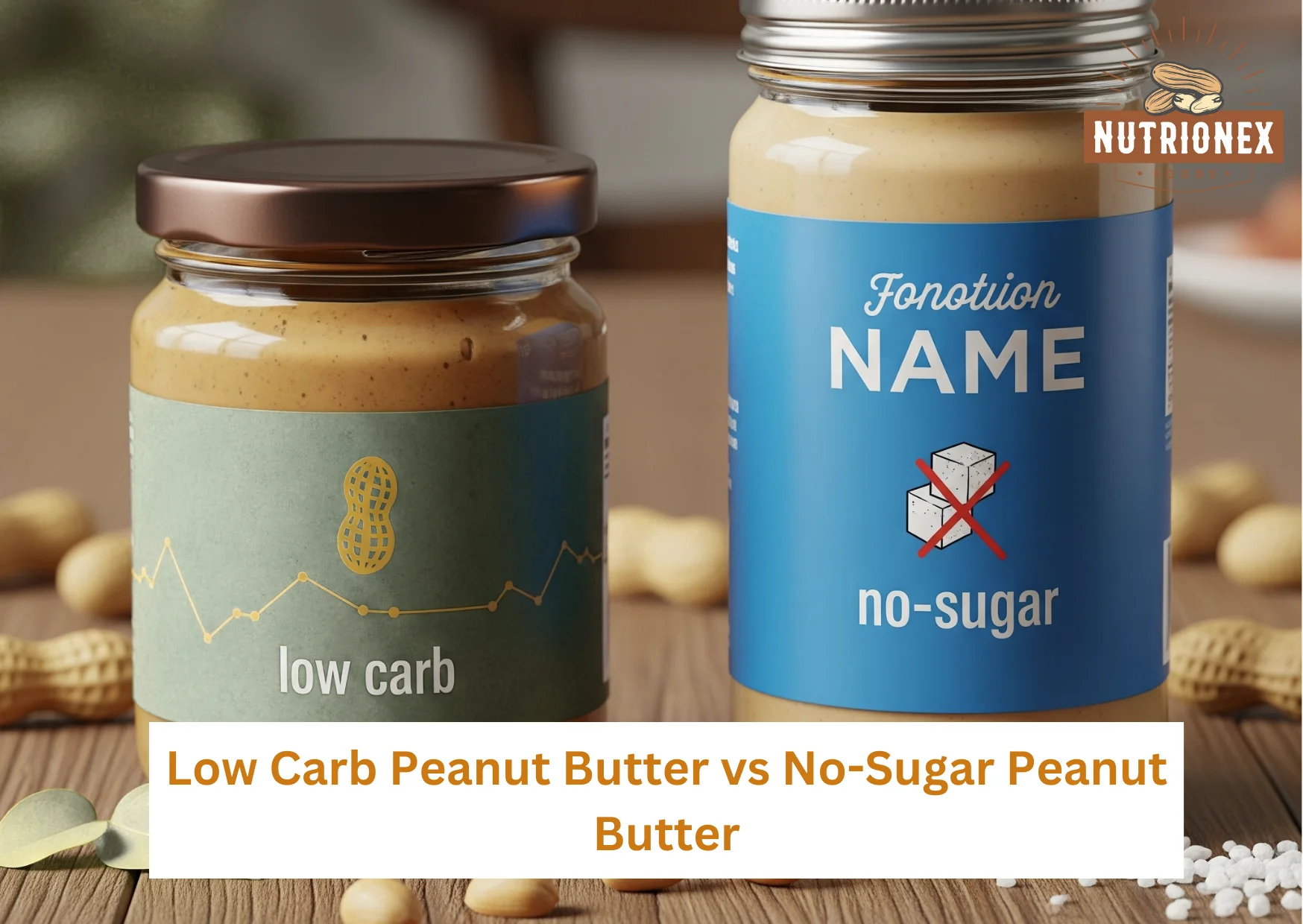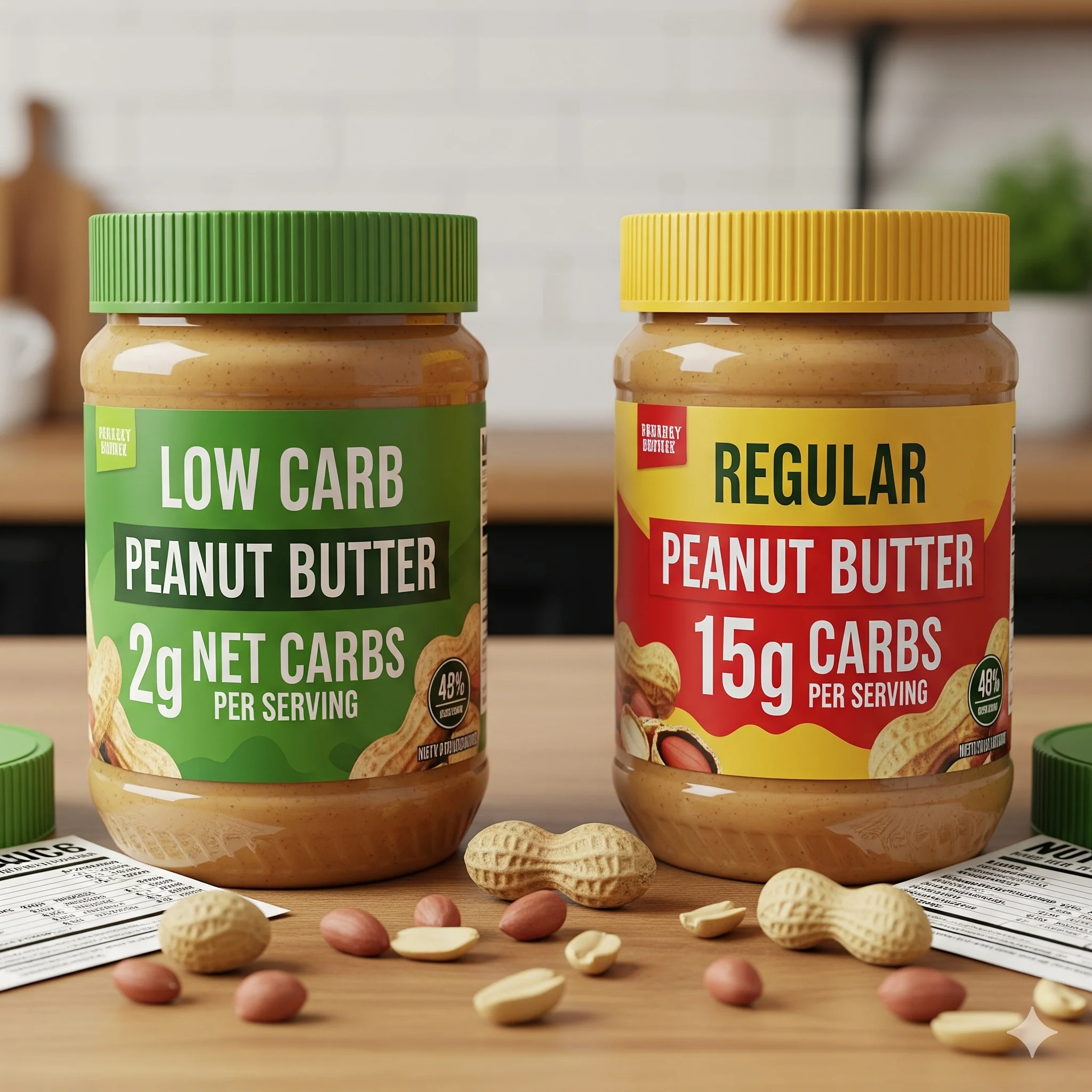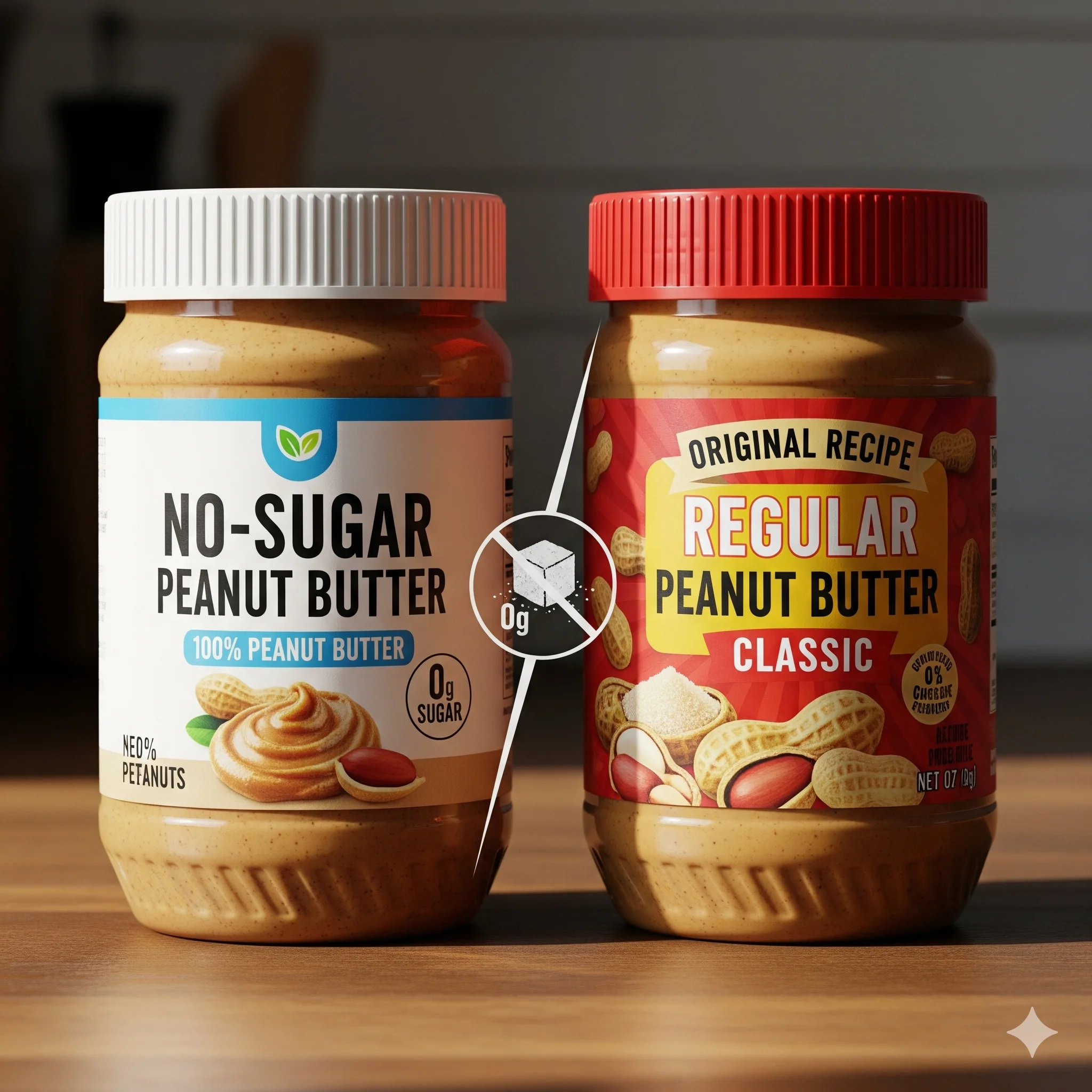Ketogenic Diet Compatibility
Less than 20–25 grams per day, which places the net carbohydrate content of the low carb peanut butter more in line with ketogenic aspirations than high carb equivalents with their four to six grams of carb per serving. This makes them ideal keto peanut butter and keto friendly peanut butter choices.
It helps in sustaining ketosis and reduces all the carbs sources, including natural carbs in peanuts. Low carb peanut butter assists people in having ketotic conditions while having familiar flavors and sensation.
Low carb peanut butter has the added advantage of being more flexibly used in daily low carb budgeting, which permits larger amounts in otherwise similar serving sizes or even daily increasing numbers in line with a lunch or dinner intake, without going over carbohydrate levels that may disrupt ketosis.
Blood Sugar Impact Analysis
The consequences of blood sugar are also different in the case of low carb and no-sugar peanut butters related to the different carbohydrate levels and glycemic effect. The knowledge of the differences will allow one with diabetes or blood sugar-related issues to make proper decisions.
Low carb peanut butter- The low carbohydrate content and low ratio of fat and protein levels that lower glycemic response also tends to devolve into low glycemic response lowering the rise in the blood sugar level. This qualifies it to be used by people suffering from diabetes or insulin resistance.
No-sugar peanut butter glycemic impact is considerably low in comparison to sugar-added and might have slightly better blood sugar consequences because of the carbs that are inherent in peanuts. The reaction is moderate because of the protein and fat levels.
Both of the two alternatives are better in insulin sensitivity concerns compared to standard sweetened peanut butter, but the low carb alternatives can be more beneficial to people with strong insulin resistance or to patients with diabetes control issues.
Get Best Quality Peanut Butter
Both types have sustained energy benefits because of their protein and healthy fats composition, whereas low carb varieties can be an even better choice due to their ability to maintain stable levels of energy for those carbohydrate-sensitive people.
Low Carb vs No-Sugar Peanut Butter: The Key Differences
|
Feature |
Low Carb Peanut Butter |
No-Sugar Peanut Butter |
|---|---|---|
|
Carb Count |
Typically lower |
May vary |
|
Sweeteners |
Often uses keto-friendly sweeteners |
No sweeteners added |
|
Sugar Content |
Minimal or sugar-free |
No added sugars |
|
Ideal For |
Keto, low-carb diets |
Sugar-free lifestyles |
|
Taste |
Slightly sweet (from sweeteners) |
Pure peanut flavor |
Weight Management Applications
Low carb peanut butter vs. weight loss can be beneficial to people who engage in lower-carbohydrate weight loss programs and the two options can be effective when used to promote weight loss when taken in the right amount.
Both types are beneficial in appetite control because their protein and healthy fat help to keep one full. The decreased carbohydrate content of the low carb types can possibly give a little extra appetite suppression to some people.
The options are still high in caloric density, which needs to be carefully controlled, no matter the level of carbohydrate in the food. The advantages of weight management are related more to the overall calorie consumption than to a specific amount of carbohydrates.
Low carb peanut butter can have metabolic benefits such as increased fat oxidation and flexibility of the metabolism of individuals used to lower carbohydrate diets.
The factors of sustainability are supportive towards the adoption of the most appropriate option to incorporate into the diet and lifestyle because in the long run, how they are maintained usually defines whether one is successful in their weight management plan or not and not so much on the slight differences in nutrition.
Taste and Texture Differences
The Low-Carb Peanut butter flavour can be different from the regular one because the processing time has changed and they might be using some other types of sugar. There are products that retain true peanut flavour and there are products with a slightly changed taste profile.
Texture Differentiation in Low Carb Products Texture differing in low carb products may be done through added fibers or protein isolates, which will produce a different mouth feel experience than traditional peanut butter. There is a high difference in the quality of brands and formulation.
The no-sugar peanut butter does not use artificial sweetening, and it more often than not keeps a great deal of the genuine, natural peanut flavour. The taste is more analogous to the traditional natural peanut butter, with a flavour profile that is automatically appealing to consumers who do not like to have their flavours altered..
The level of sweetness also differs between the two types, where no-sugar mixes depend on the natural sweetness of peanuts and some low carb mixes may contain other sweeteners to support more palatable tastes.
The optimal option is usually dictated by consumer tastes, and the consonance of these tastes with the tastes and textures can have a key role in whether the diet can be adhered-to and enjoyed in the long run.
Health Benefits Comparison

The peanut butter health benefits of low carb consist of improved blood sugar levels, possible weight loss benefits and the ability to provide nutritional support on low-carbohydrate treatment regimens. The low level of carbohydrates can be advantageous to people with metabolic abnormalities.
The advantages of no-sugar peanut butter lie in the removal of added sugar without changing the natural nutrition levels of peanuts. This method is a way of giving actual nutrition without any artificial sweetening or over-processing.
Heart health advantages are not too different between the two types since their healthy fat levels are the same. These are the two alternatives that are beneficial to the heart due to the presence of monounsaturated fat, as well as a lower amount of sugar content in them than the traditional sweetened products.
Low carb types of peanut butter could help with diabetes management a little more, because there are fewer carbs in them, but both types of peanut butter are important steps forward when it comes to regulating blood sugar.
The quality of nutrition, in general, relies on the formulation of the products and both creams share benefits compared to highly processed and sweetened competitors.
Ingredient Quality Considerations
Other ingredients used in the low carb peanut butter can be other additives such as fiber supplements, protein isolates, or other sweeteners. The quality of ingredients is of concern when it comes to the evaluation of the nutritional value.
The processing levels of the two forms vary, with no sugar products tending to be lightly processed and low-carb products being slightly modified in order to attain low-carbohydrate content.
There is a potential additive issue with some low carb products that contain added artificial ingredients in a bid to obtain the target nutritional value. By reading labels, one would be able to find products that are made using only a few ingredients of high ingredients.
Both categories have organic options, but no-sugar in most cases has more organic variants since production is easier and the product has a wider range of consumers.
Dietary Restriction Compatibility
Peanut butter dietary restrictions by low carb make it the appropriate peanut butter that can be utilized in ketogenic, Atkins, and other low-carbohydrate therapeutic diets. Their lower volume of carbohydrate content fits more in austerity carbohydrate restrictions as compared to no-sugar varieties.
No-sugar peanut butter limits are of interest to people who want to avoid added sugar, or to people whose diets involve paleo diets, or who want to focus on blood sugar but do not need very low carbohydrate intake. This alternative is effective in medium-carb methods.
Considerations of allergens are still similar between the two kinds, where peanut allergies are the main issue. There are also additions of allergens to low carb varieties.
Any special dietary requirements, such as managing diabetes, a diet to lose weight, or having better metabolic health, are likely to favor one of these over the other based on personal objectives and medical advice.
Where to Buy Quality Low Carb and No-Sugar Peanut Butter?
When you want quality peanut butter products, Nutrionex foods is a preferred manufacturer and supplier that has a variety of peanut butter products, including low-carb, no-sugar, along flavored peanut butter. They are ideal products applicable in retailing, wellness businesses, as well as with nature lovers and consumers who avoid synthetic ingredients; their clean-label strategy and customized packaging strategy make it ideal.
No matter what kind of peanut butter you want, whether it is flavored nut butter, organic peanut butter, or even protein-packed nut butter, Nutrionex Foods has the quality, consistency, and nutrition you want in a jar.
Conclusion
Comparing low-carb and no-sugar peanut butter, both types bring tremendous benefits over traditional types of peanut butter, which are always sweetened, with two types being different in use and preferences depending on the diet. The peanut butter with less carbs, especially low-carb peanut butter and no-sugar peanut butter, is better in agreement with ketogenic and very low-carb diets, whereas no-sugar peanut butter has fewer added sugars in its manufacturing process.
It depends on your dietary aspirations and bodily condition, as well as personal inclination, to make the best selection. Individuals on more extreme low-carbohydrate diets may see greater benefit with low carb products, whereas individuals who wish to reduce added sugars without drastically limiting carbohydrate intake may find no-sugar products to be most appropriate.
Low carb and no-sugar peanut butter are much healthier substitutes to commonly available sweetened peanut butter, as they offer not only the health value of peanuts as a product, but they also aid in numerous health and fitness purposes. The result can only be an ability to marry up product attributes to an individual's needs and personal preferences to provide the best results in the long term.



